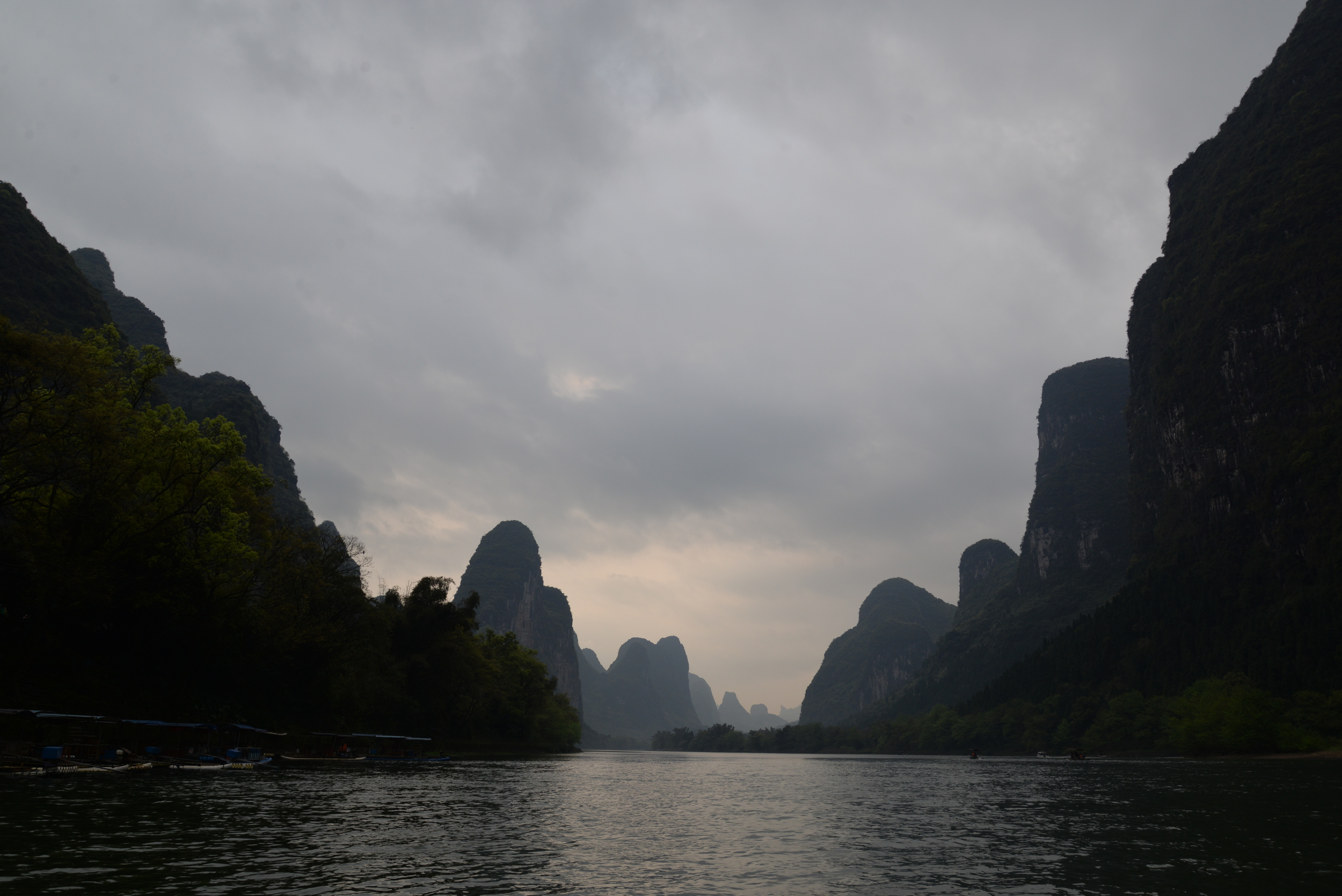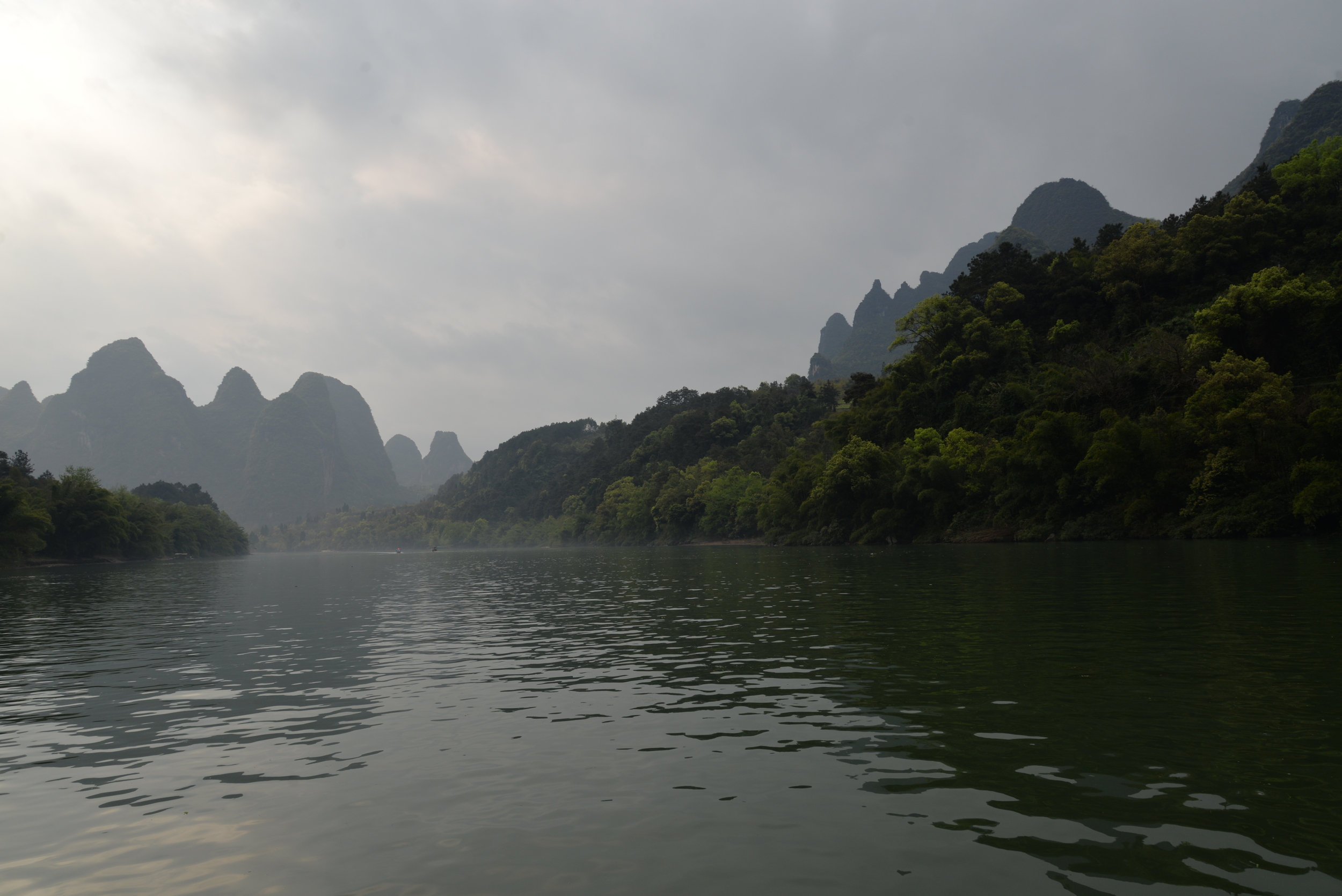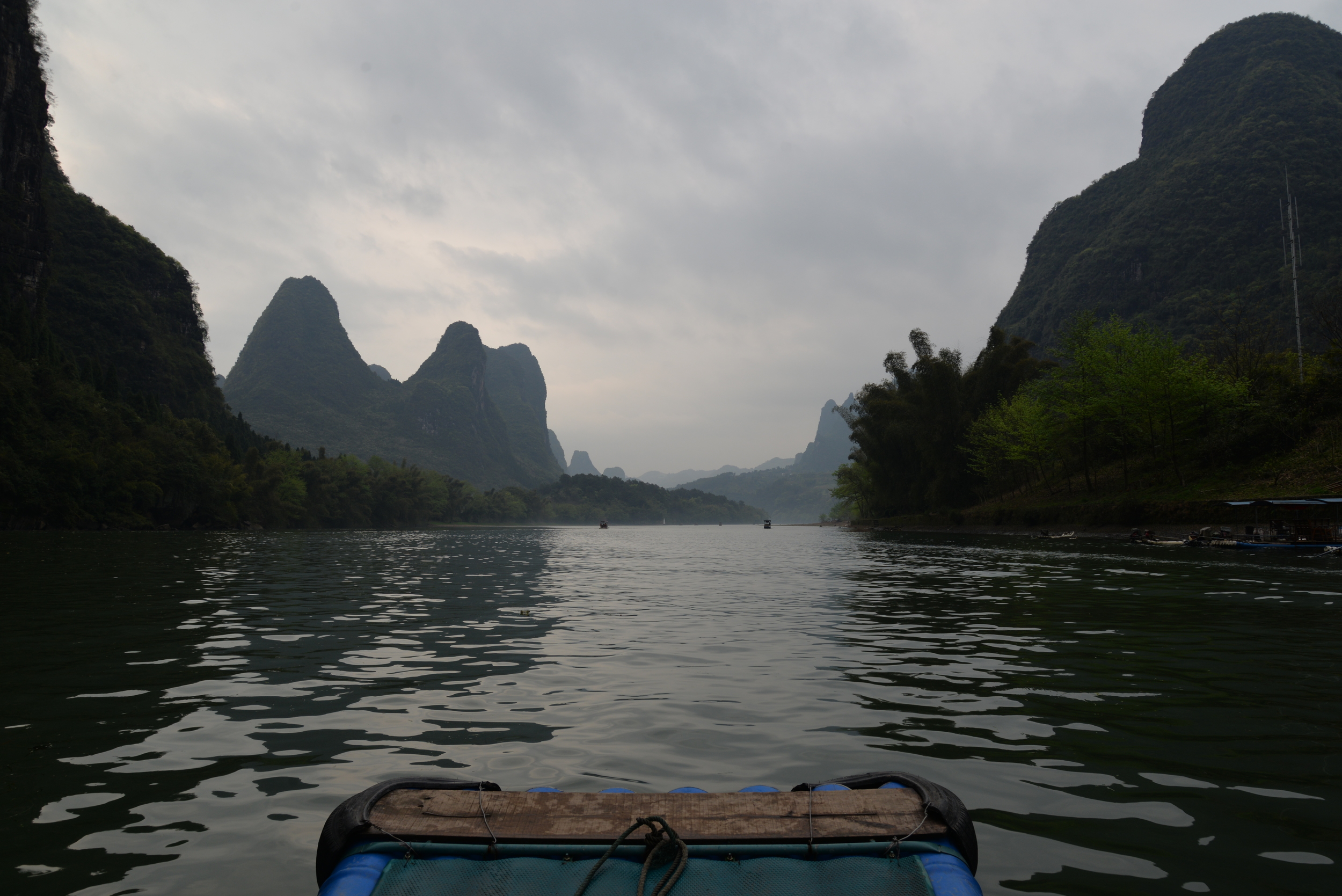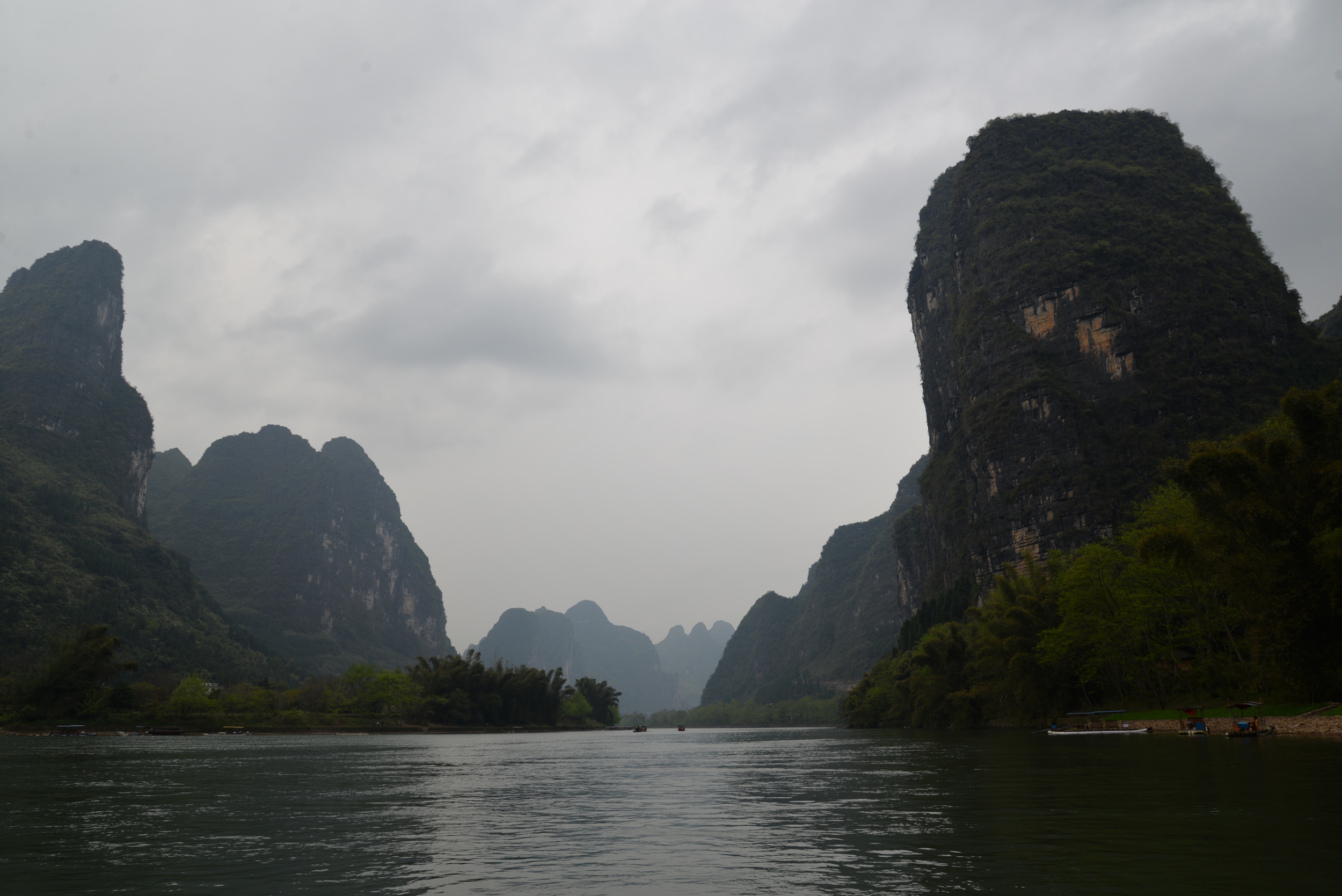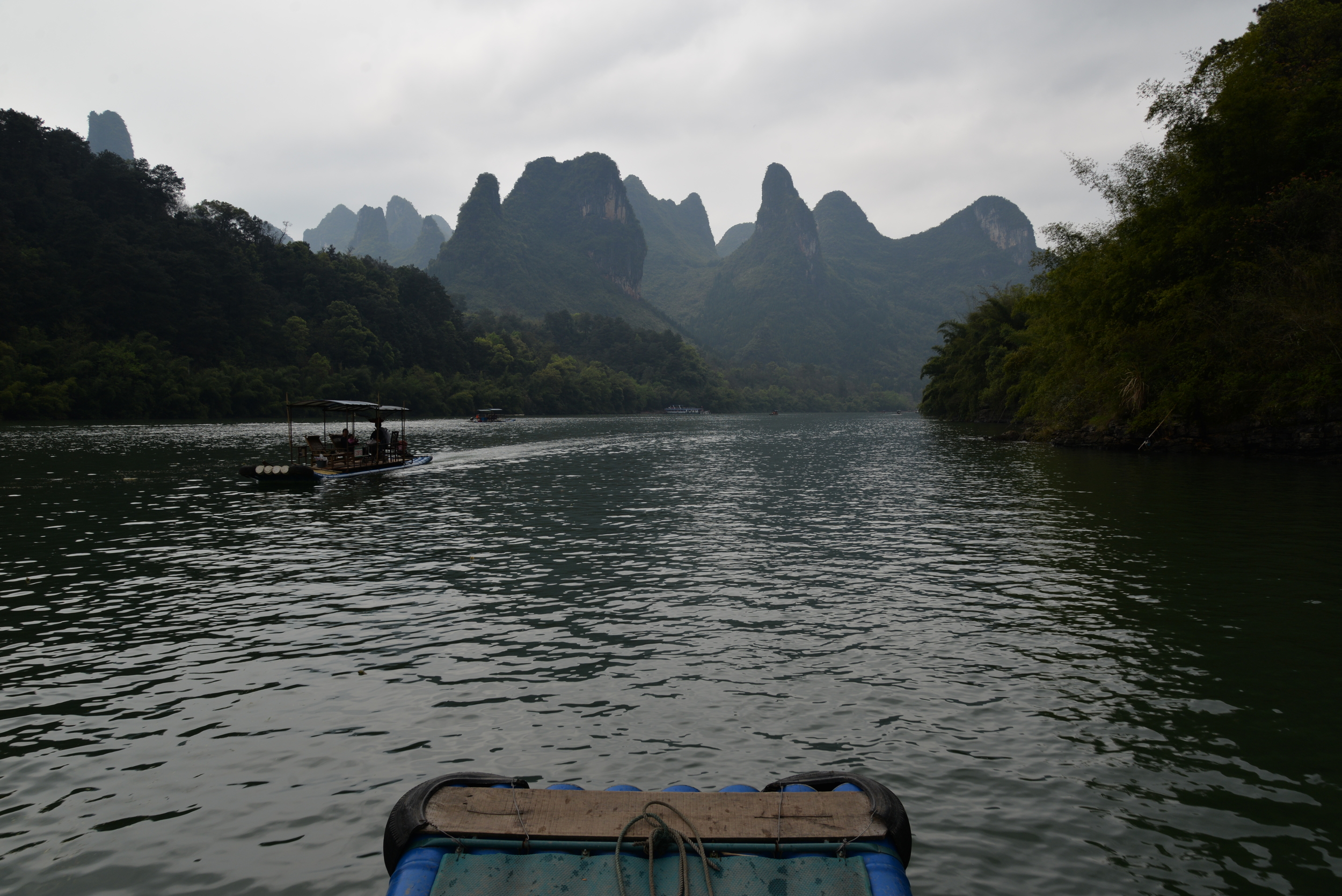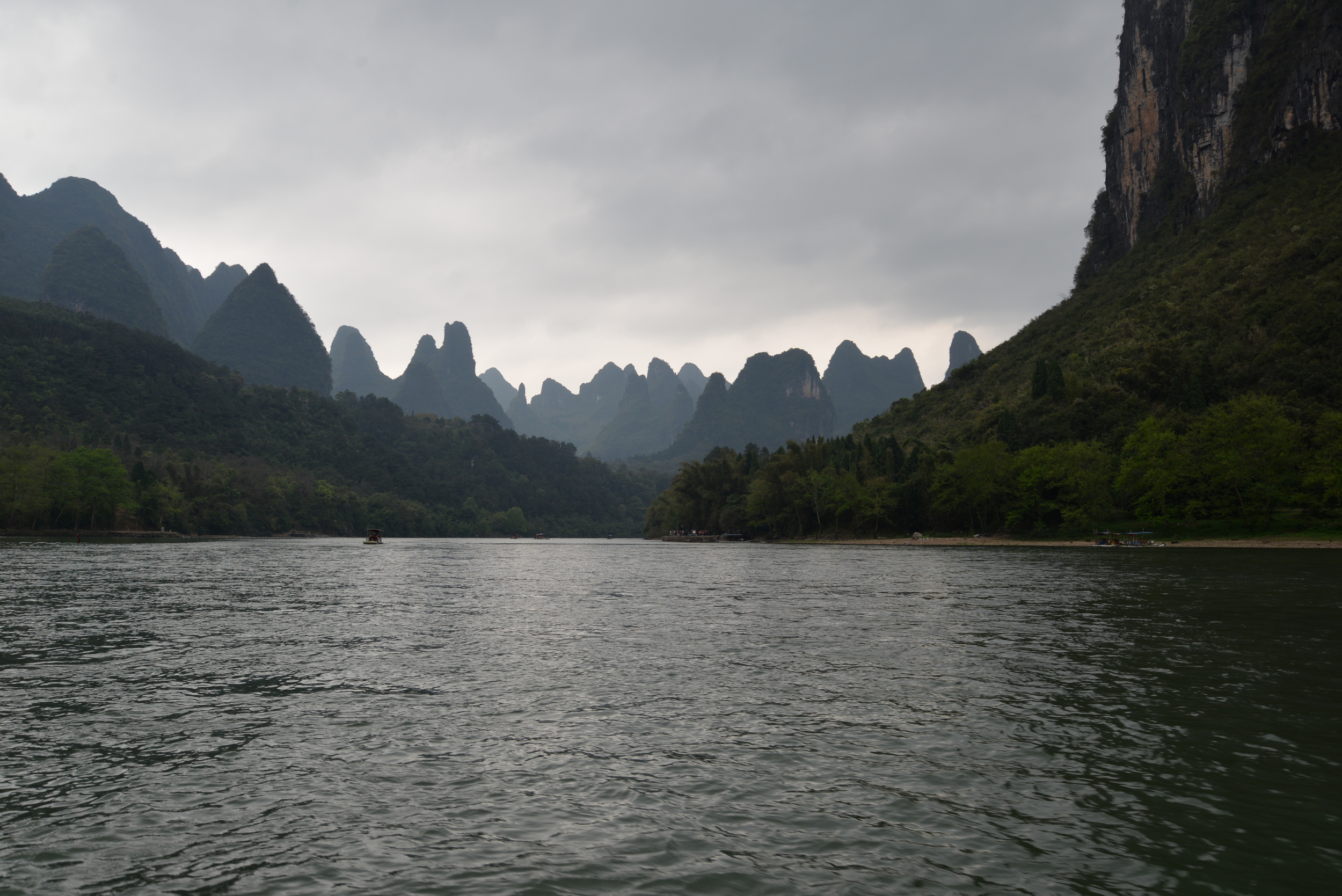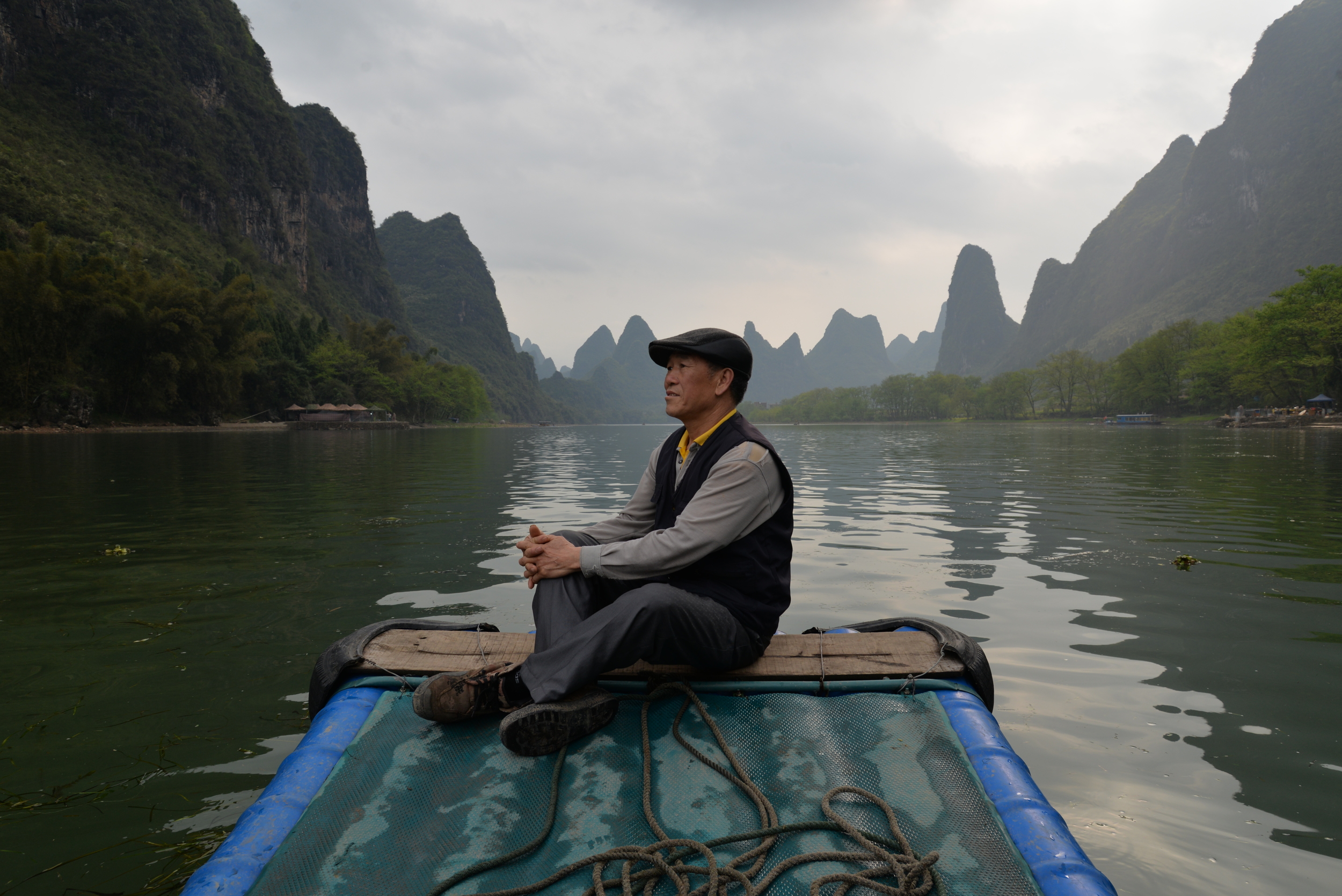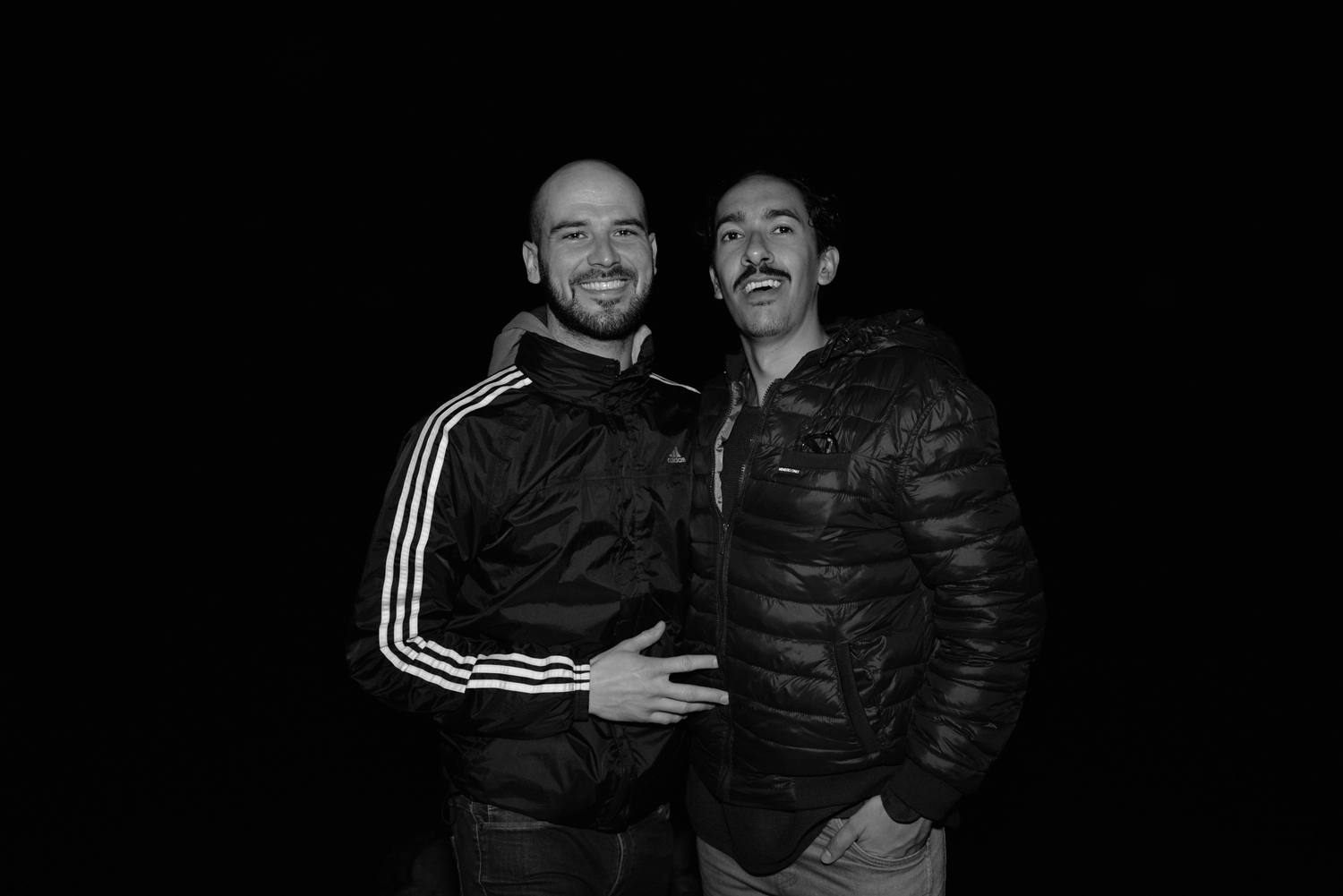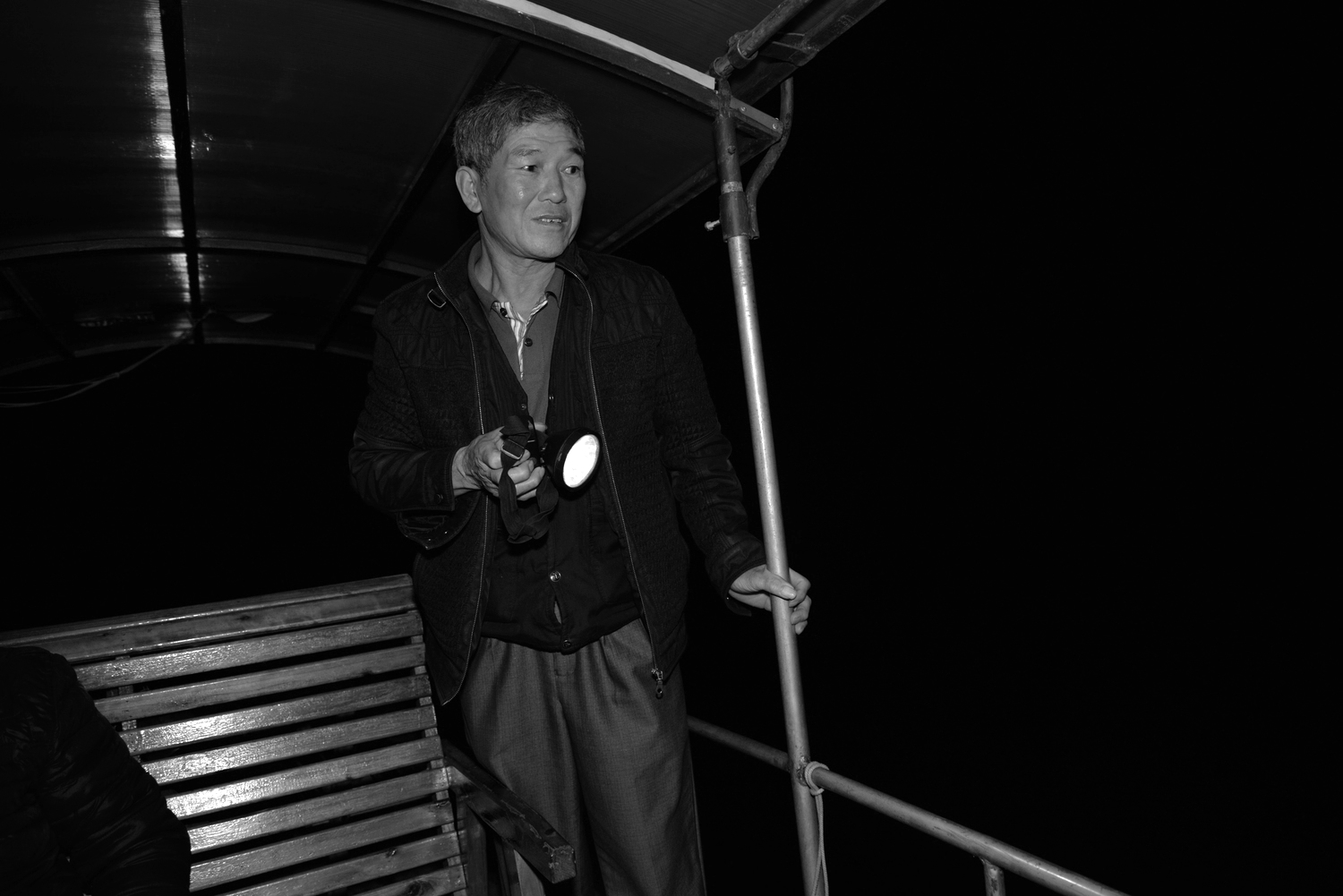A bamboo boat ride with the unflappable Maoshifu, introduces me to the majesty and the beauty of the Guilin mountains in rural China. Shop the story.

Mao of the Mountains
photos and words by felicia williams // Li River - Guangxi Zhuang, China // shop the story
Me: “Hi! I’m at the pier, but I don’t see your uncle. Should I wait at the house?” ” Send. Ping! Haibo: “You can at home wait Maoshifu, he will come to Laojia, take you go to Xingping. Have a nice day.”
It’s 8:30am in the fishing village of Langshi and I’m already three hours into my morning.
Due to the terrible wonders of jet-lag and my general excitement while traveling to a new place, I’ve been unable to sleep past 5 or 6 a.m. this entire trip.
While this makes for a great start to the day (early morning photo shoots, less crowded exploration, lazy breakfasts), it’s tough at the end the night, when a woman in her early thirty-somethings gets a sideways looks for wanting to crawl back to bed at 8pm...
The morning is crisp, beautiful and the perfect temperature for a day of exploring the area and the small communities along the river.
After taking my 6 a.m. shower, I put on my favorite, go-to travel uniform: a flowy, white, polyester button-up, dark jeans and my traveling boots.
You may read that line about the shirt and think, silly rabbit, aren’t you worried about getting your nice top dirty? I thought you said you were hiking! I thought you said you were an explorer! Pfff! It sounds you’ve dressed yourself up for a cocktail at the Ritz.
To this I say, behold my truths and be converted!
I cannot, will not, ever be able to endorse this shirt enough.
It never wrinkles, it’s easy to wash and quick to dry (this is very important when you need to travel light on long trips). It’s breathable and reflects heat away from me, but it’s also long-sleeved to keep me warm if things get chilly. It’s loose but still looks good tucked in (for lady) or left out (for the crazy) and is perfect for a quick self portrait. In the very, very humid climate of China, I couldn’t ask for a better top.
I quickly observe my stylings in a small mirror and immediately think of the smooth talking, British affected voice of Ernie Hudson from that movie Congo in the 90s. “I am your great white hunter, but I happen to be black.”
Read more style tips on Nordstrom's Threadless Article: What to Wear to Work When You’re a Microsoft Designer and Treasure Hunter
I wait for Mao in the great room of Laojia, it’s wooden doors thrown open to the sunshine and to the songbirds of the morning.
I make myself a cup of tea and try to recite a few phrases of Mandarin from memory. For whatever reason (perhaps the jet-lag) I cannot for the life of me remember more than ‘thank you’ and ‘hello’. I can’t even seem to retain ‘yes’ or ‘no’, leaving those types of answers to head nodding or shaking, along with big, supporting facial expressions.
Are you good at charades? This is what I imagine I’ll ask people who, like me, are foolish and crazy enough to venture into mainland China without any knowledge of Mandarin. Thankfully I am good at charades. I naturally talk with big gestures and open expressions.
Maoshifu, my boatman and guide (and not “the uncle”, as I had previously thought) will probably not be able to speak English, which is understandable and expected here in mainland China. With nearly half-a-day scheduled to boat, hike and explore the Li River, I wondered how I could effectively communicate with him and be respectful of his language and cultural differences.
Any concerns I had on this topic are put immediately to rest with the arrival of Mao through the back doors of the house.
Mao, a short statured and kindly old man, with smile lines lining his twinkling eyes and a youthful spring in his step, enters the room in a rush of smiles and bows and I am immediately charmed off my feet. He is clearly excited and he says something to me, loudly and and confidently in Mandarin.
Okay, charades time.
I lower my head a bit and slowly shake it from side-to-side. I make big “‘puppy eyes’ and give him the universal look of I’m so sorry, but I have no idea what you’re saying.
He takes one look at my face, laughs heartily and repeats his phrase, but this time adding his own gestures and facial expressions, communicating a set of instructions I readily understand: Follow me to the dock! Let’s go to Xingping! This guy is definitely good at charades.
Read more off-the-beaten-path adventures: To The Edge of the Desert
The view is breathtaking. The beauty I had experienced the day before, the day when I arrived in Langshi, paled in comparison to the beauty I was experiencing on the river, at this very moment.
The morning light, softly weaving it’s way to the water through a thin blanket of delicate white clouds, cast a beautiful back light onto the landscape. The limestone mountains rise high out of the water, in beautiful punctuations of grandeur and majesty, surrounding the scene. Each individual rock is like a skyscraper risen from stone and shorn by time. They announce themselves in shades of blue and green, communicating their vastness, all along the water’s edge.
Our early morning excursion means minor to no boat traffic, making the waters of the Li relatively calm. We carve a slow, thoughtful path through the jade colored water and look out towards the distant peaks, to see their mirror reflection in the inky distance.
I cannot stop taking pictures.
I stay at the leading edge of the boat and take shot after shot of the amazing scenery. Mao, through our highly effective charades game, stops at my request at different times along the way, pausing to allow me to get better angles or see certain areas up close.
We also have quiet moments, with only the hum of the motor churning in the water, and the wind rushing past our ears as our soundtrack.
An hour in, we make a mid-way stop at a little island between the major river banks.
There are vendors here, looking to entice tourists out of a few Yuan. I kindly decline all the offers and settle to make my own souvenirs through my lens, including snapping a pretty epic picture of Mao holding up two birds on a bamboo pole.
During the ride, Mao becomes an eager and enthusiastic photographer himself, offering to take my camera and snap pictures of me.
He also delights in having his picture taken. He cleans himself up a bit, straightens out his vest, and puts on a hat for a particularly dapper shot I take of him on the edge of the boat. He is so happy when he sees the results that we both laugh with excitement.
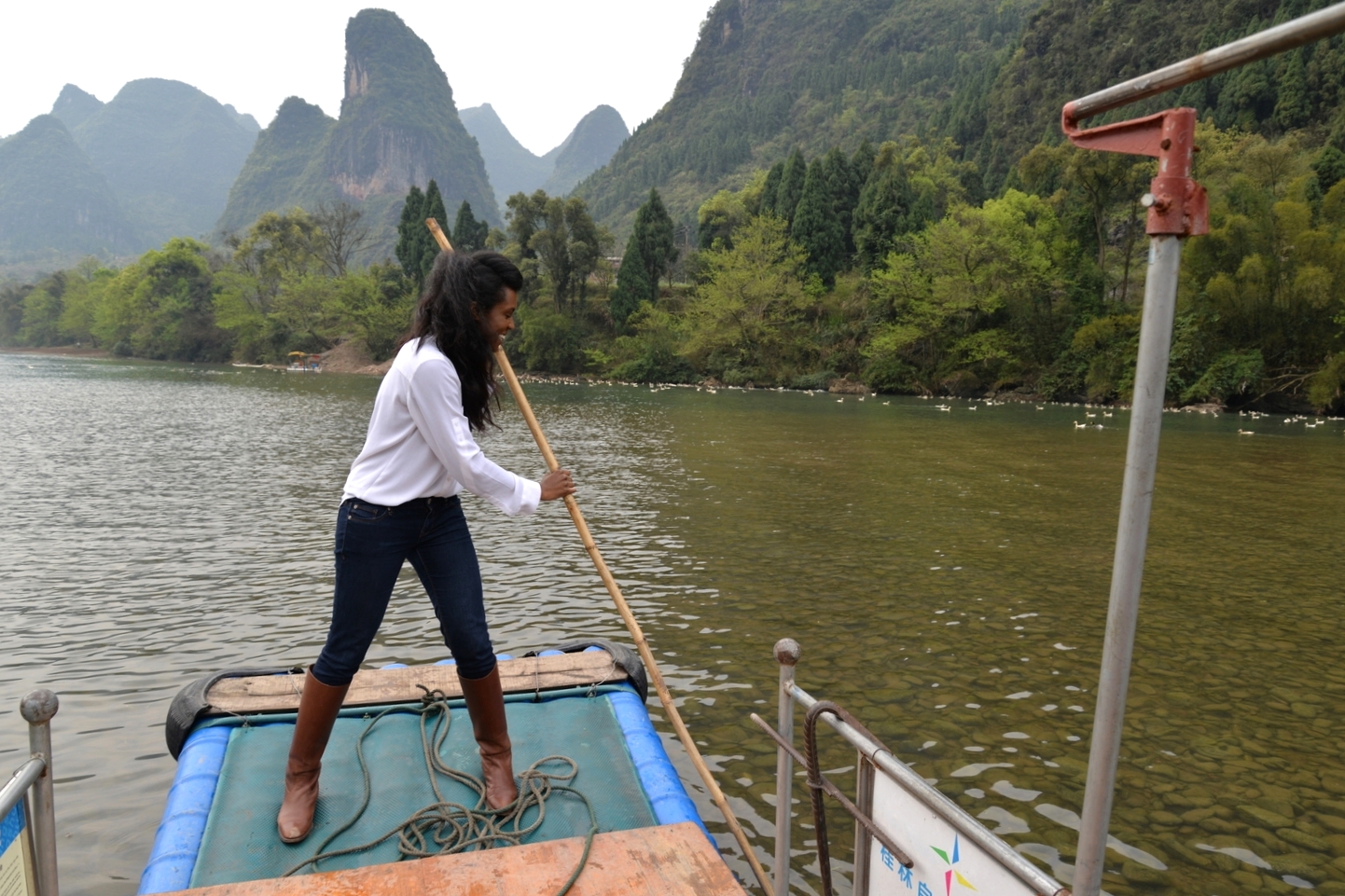
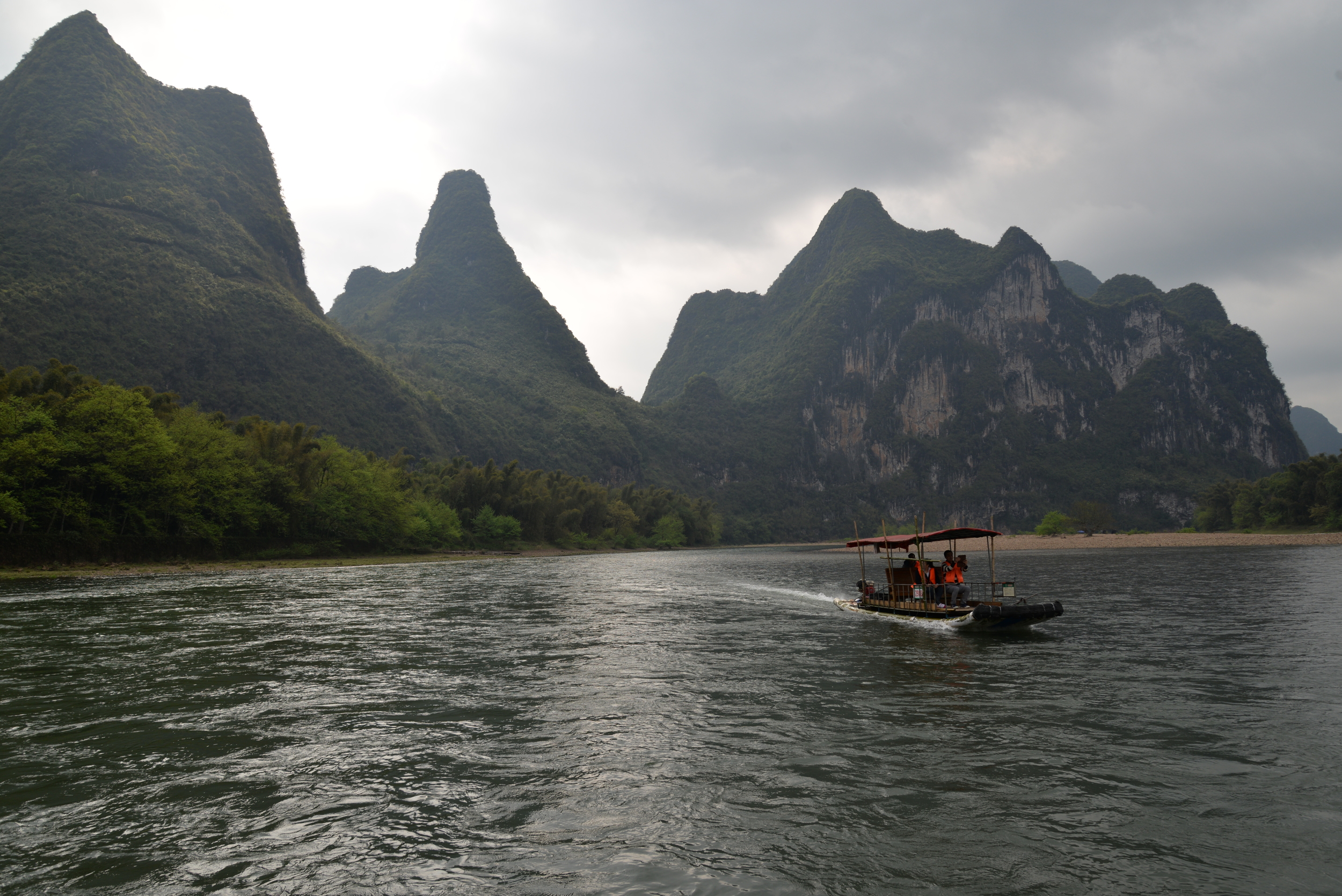
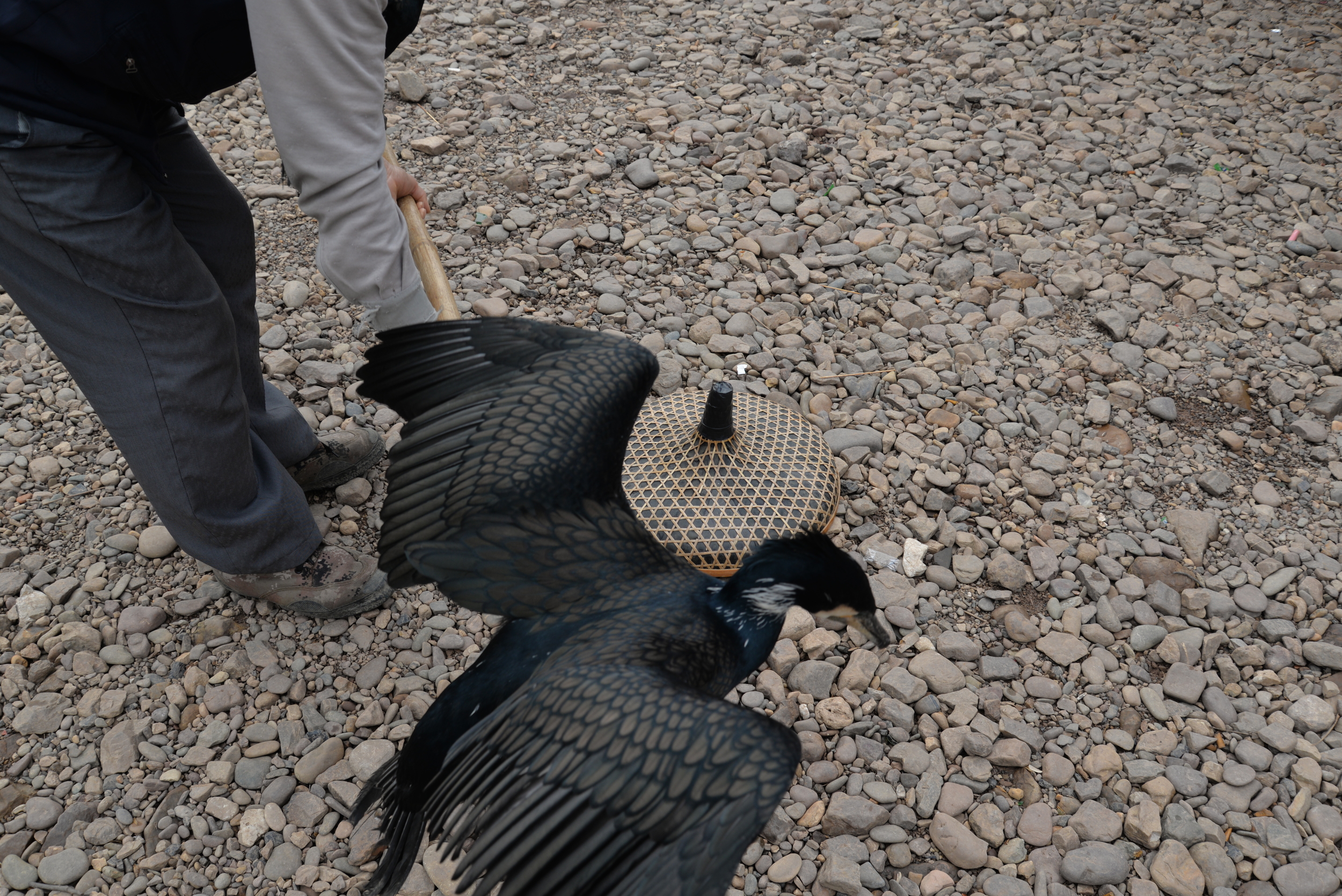
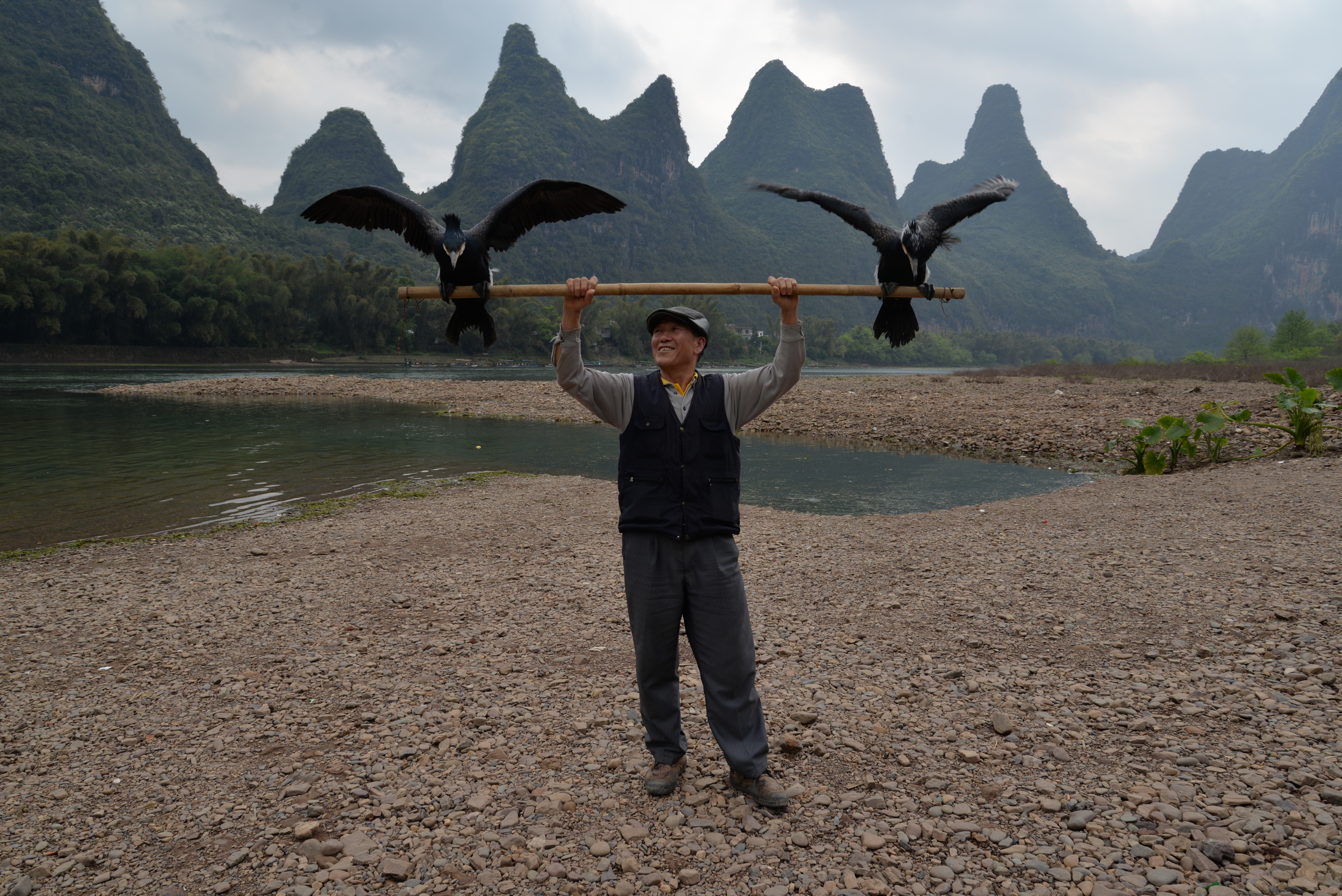
We arrive in Xingping nearly 2 hours after we left Langshi. It was a good ride, but I am eager to leave the boat and get some countryside experience on foot.
We disembarked onto the left bank and begin our walk towards town. Mao gestures to the right bank and says" Xingping." Apparently there is a crossing up ahead.
We begin by strolling along a wide road that is shared equally by pedestrians, animals and motor vehicles. It hugs the river’s edge, and as we walk, is see several tourists taking pictures a distant formation of three mountain peaks, dotted with green trees, which are relatively isolated from the rest of the mountainous landscape. Mao pulls out a wrinkled 20 Yuan bill from his pocket and points to the same formation, which is printed on the back. Elated by this happenstance, I take a few pics while holding up the note and mentally check this historical site off my “I-saw-it” list.
The bridge crossing into Xingping is very picturesque, but probably the most interesting sight are the dumfounded stares I get from the local people.
Mao walks along beside me, happy as a clam (or, as a dumpling?) in comfortable silence. He simply projects “she’s with me” energy, throwing an invisible but comfortable net over me, which quells even the hardest of starers.
Getting use to this kind of reaction isn’t something I am able to master without some effort. I remind myself that the people around me, for the most part, mean me no harm. Even so, many locals give me space, look at me askance or sometimes try and engage me with their eyes if not their words.
I'm sure that people of my skin color are not frequent visitors to this area. I get the sense that they’re waiting to see what I’ll do or what I’m about.
A group of middle school aged girls pass us on the bridge. I see one of them try to sneakily get a picture of me with her phone, to which I respond with a big grin and a peace sign. This, in turn makes her giggle with glee.
She asks me, through gesture, if I’ll do it again so she can take a better picture. I oblige her and she scuttles off after her friends, happy with her souvenir.
Read more off-the-beaten-path adventures: Damn The Weather
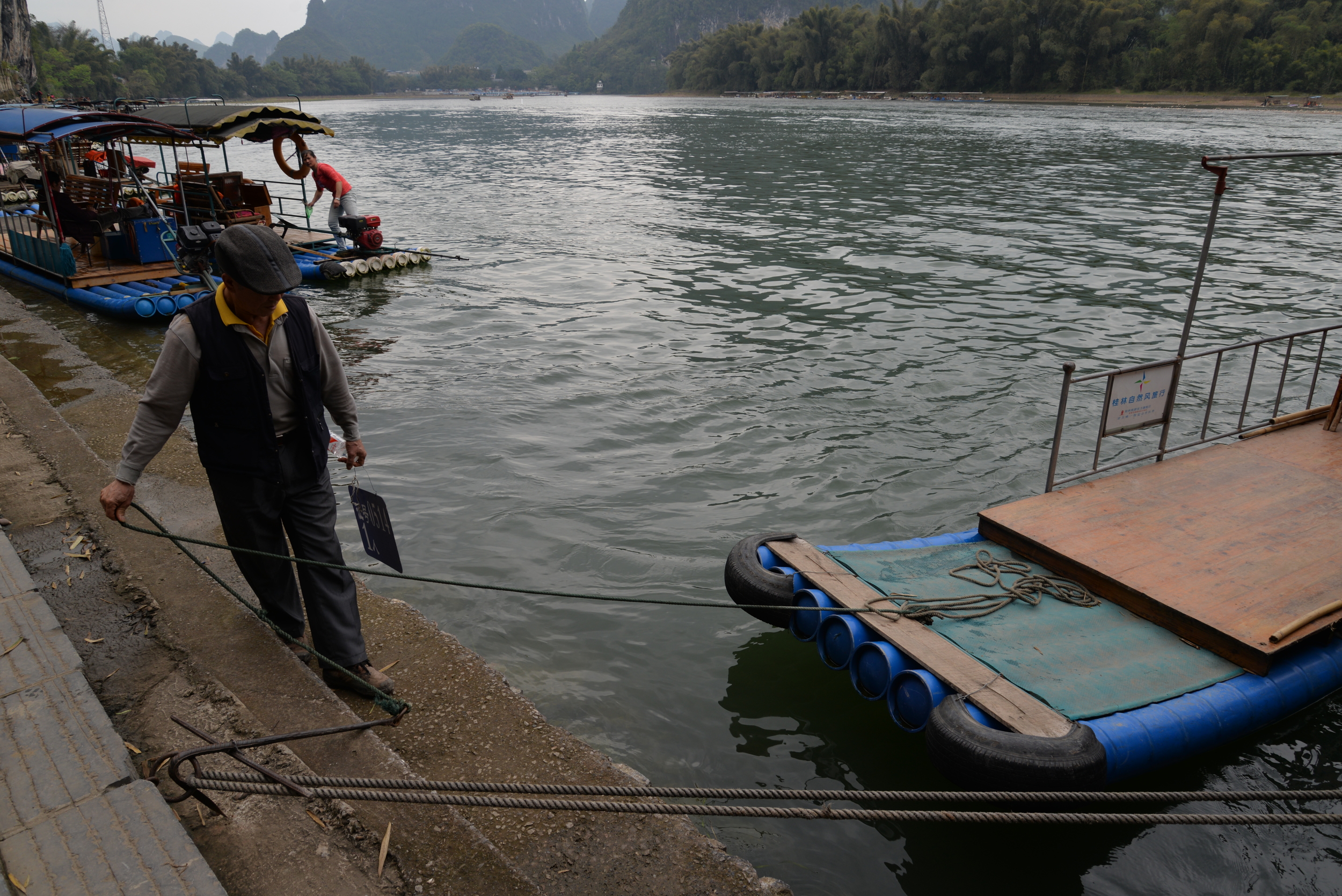
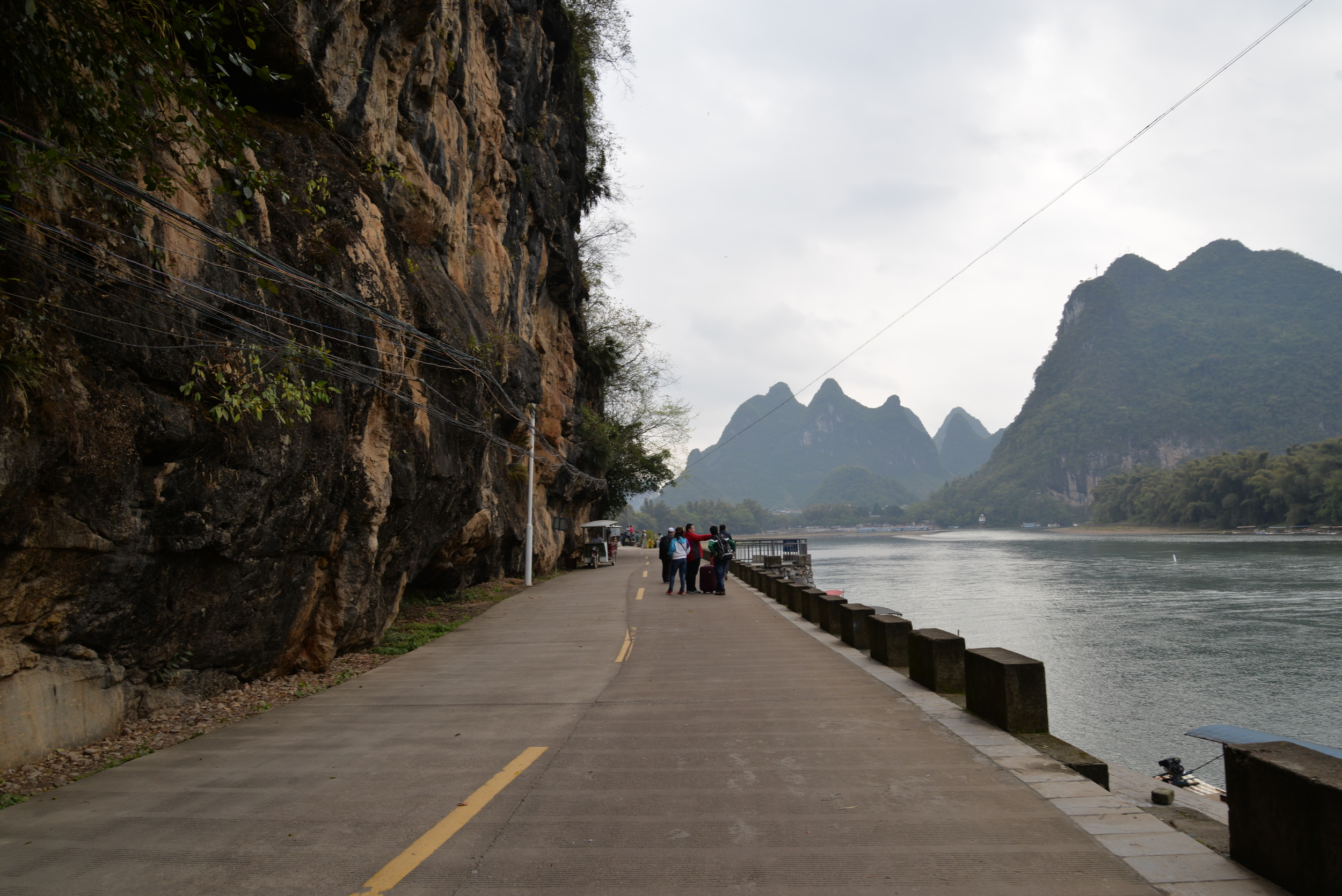
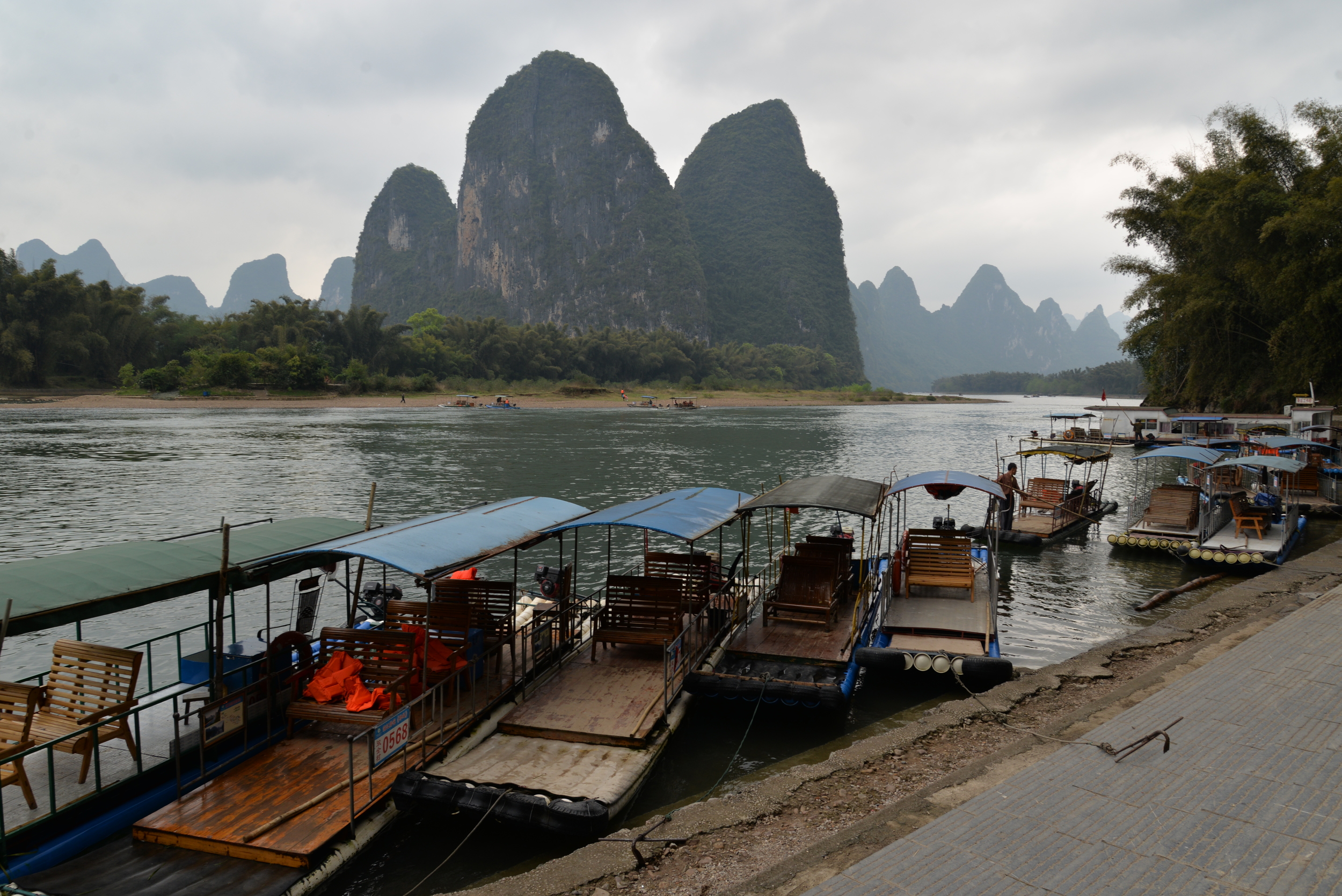
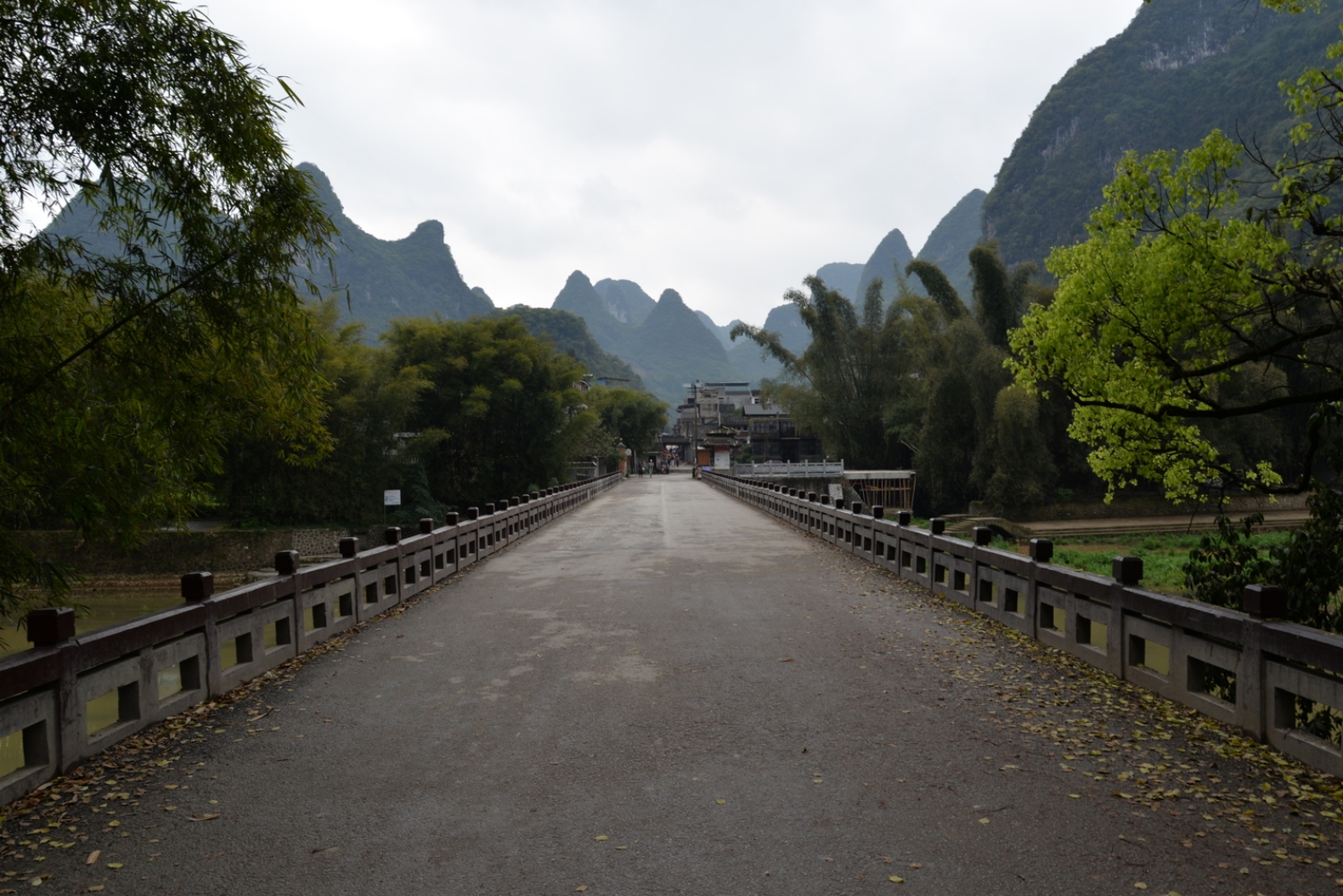
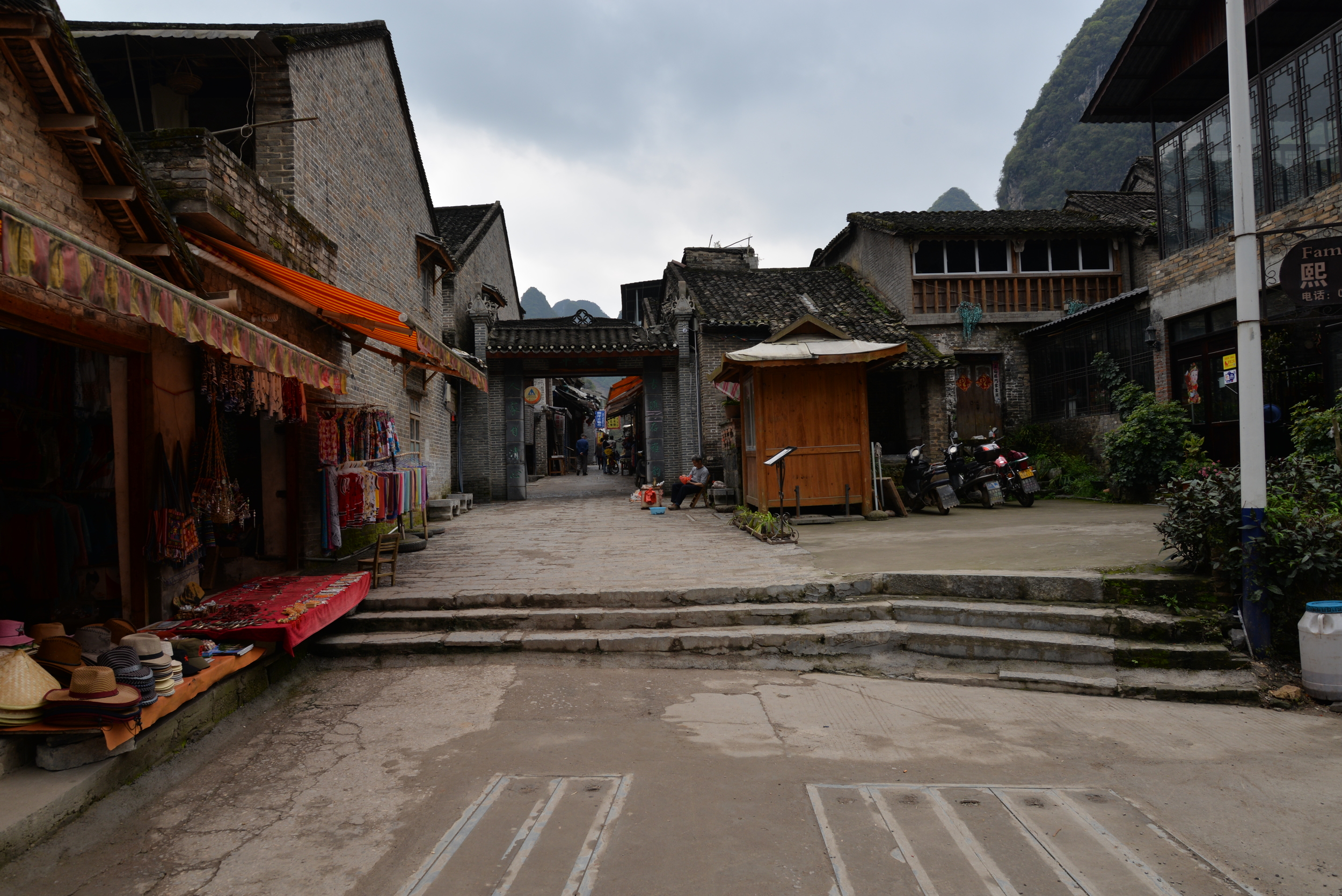
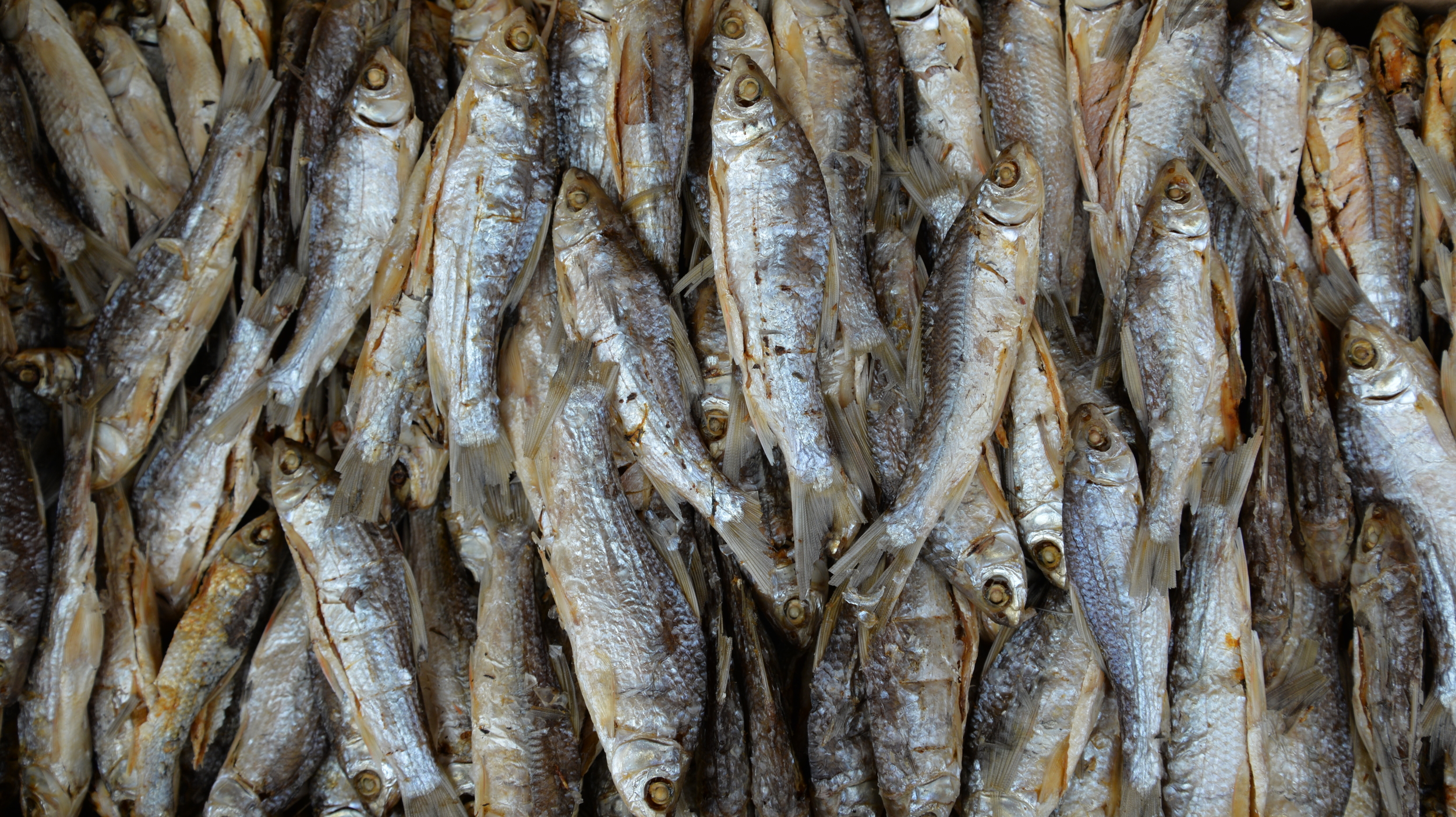
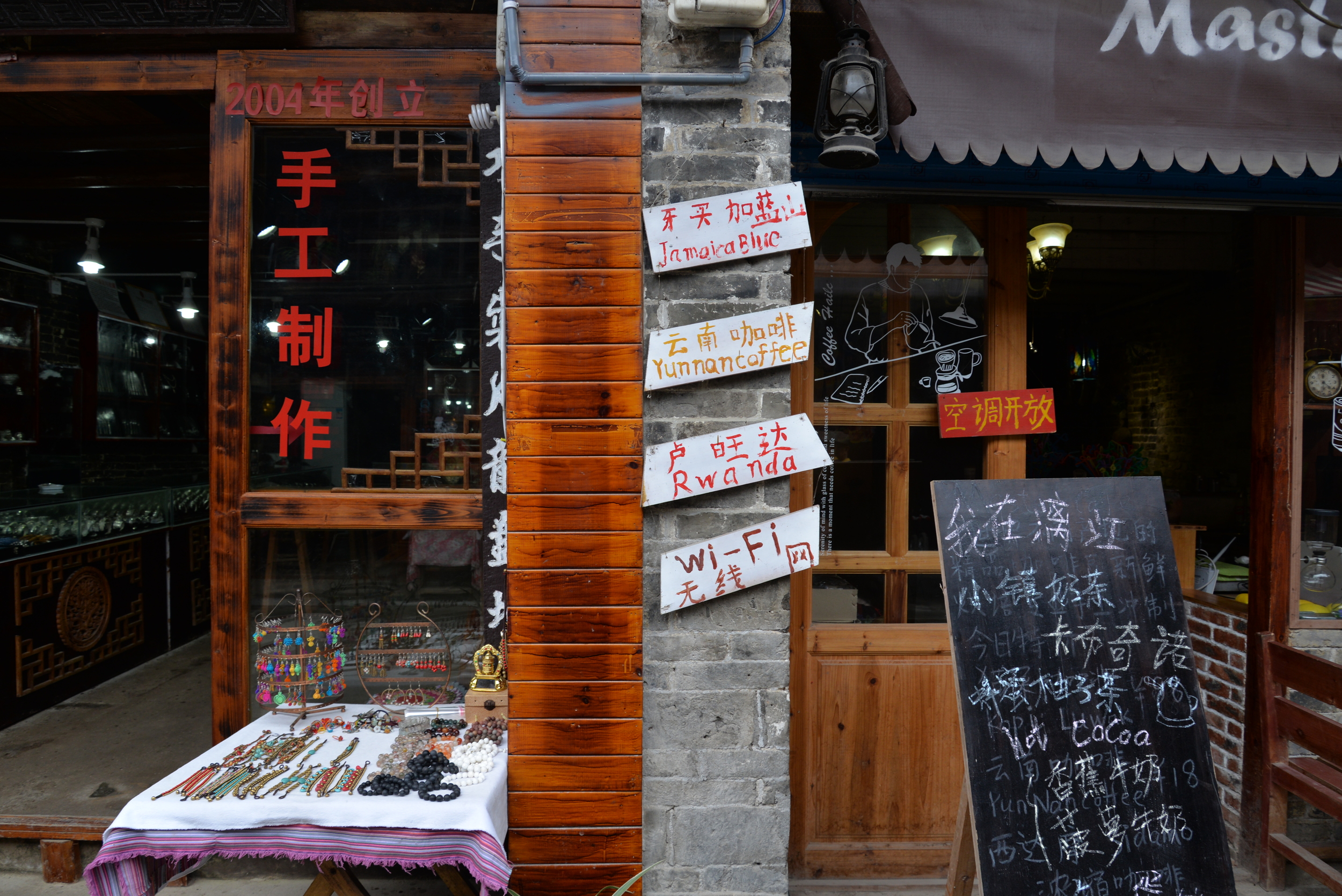
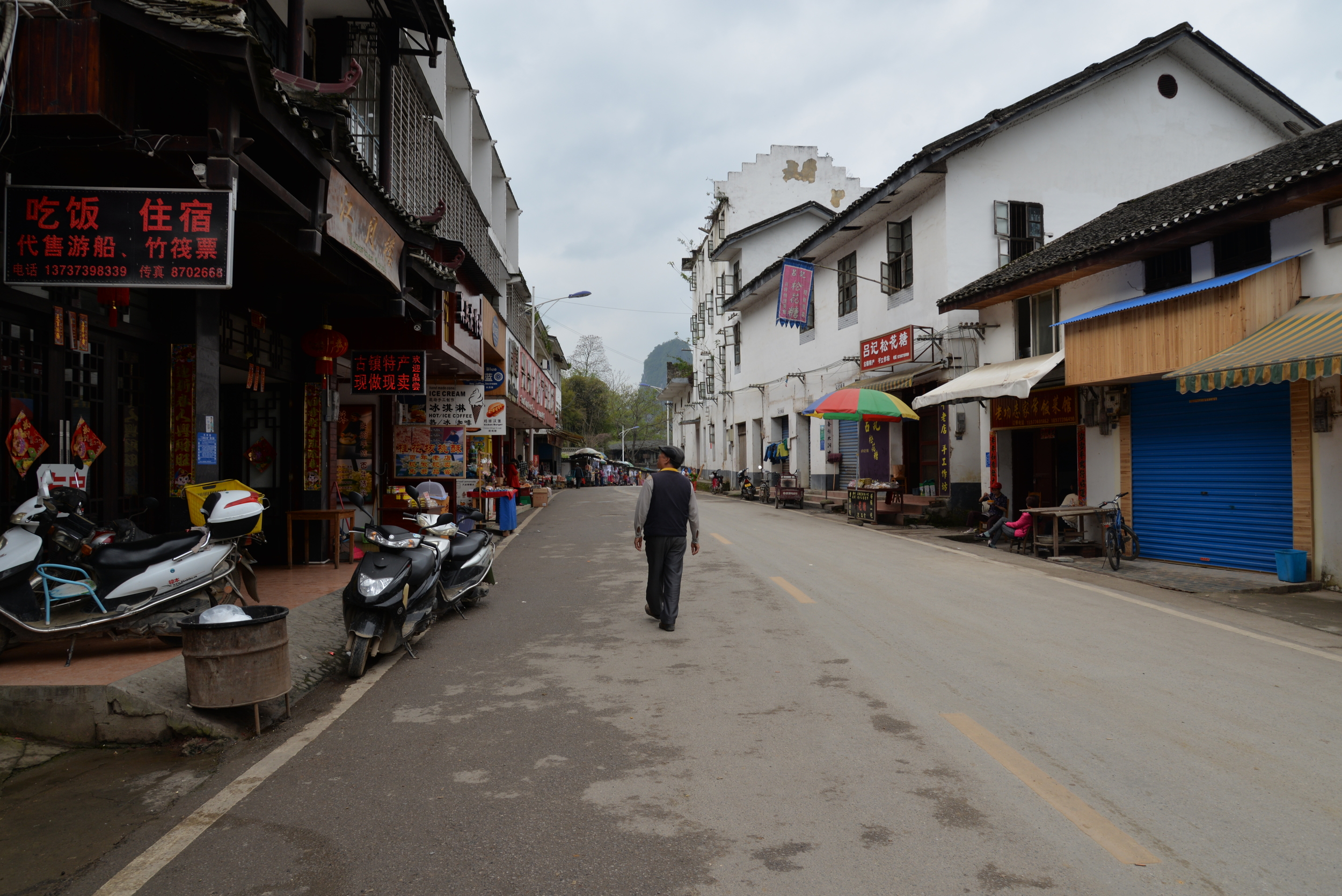
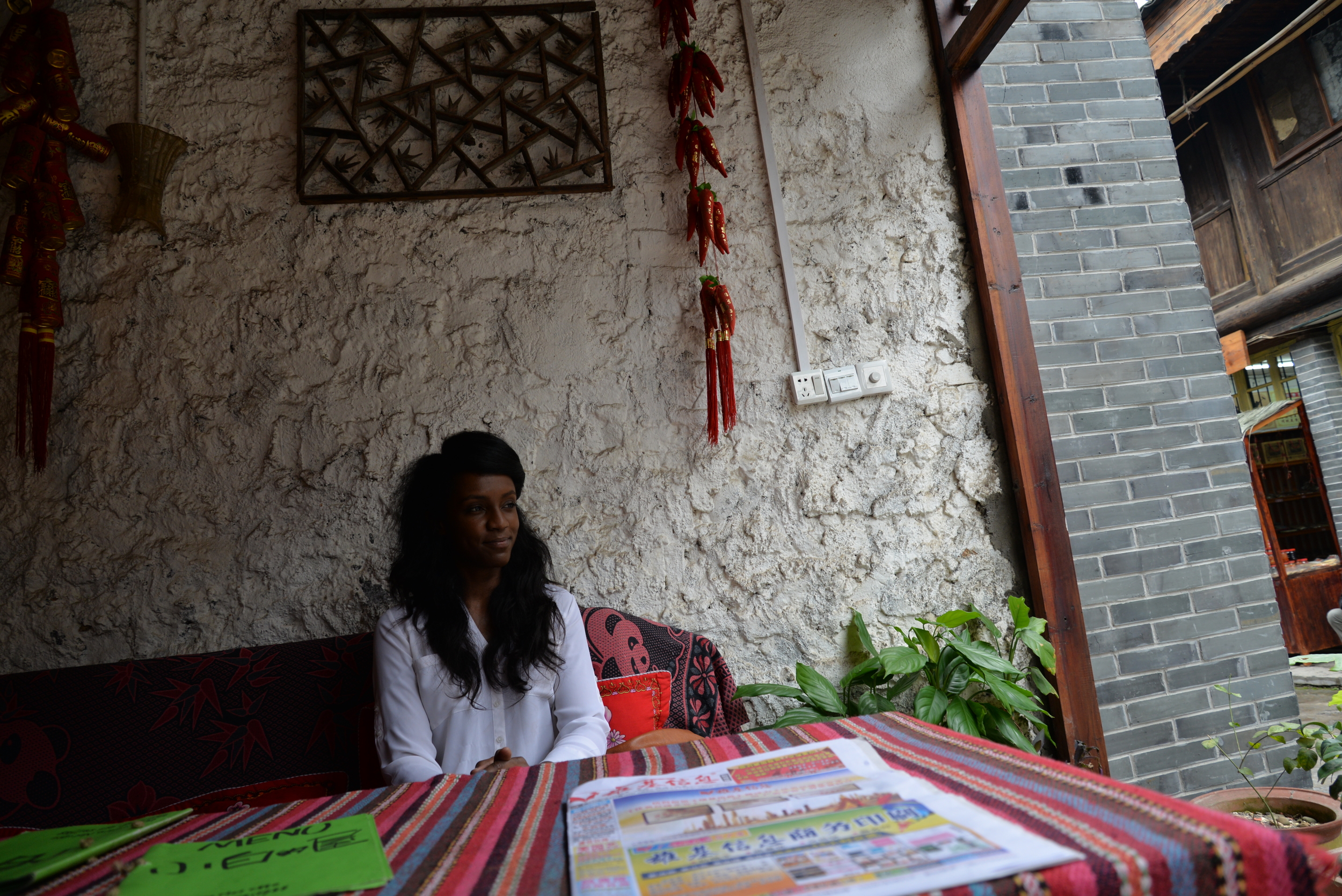
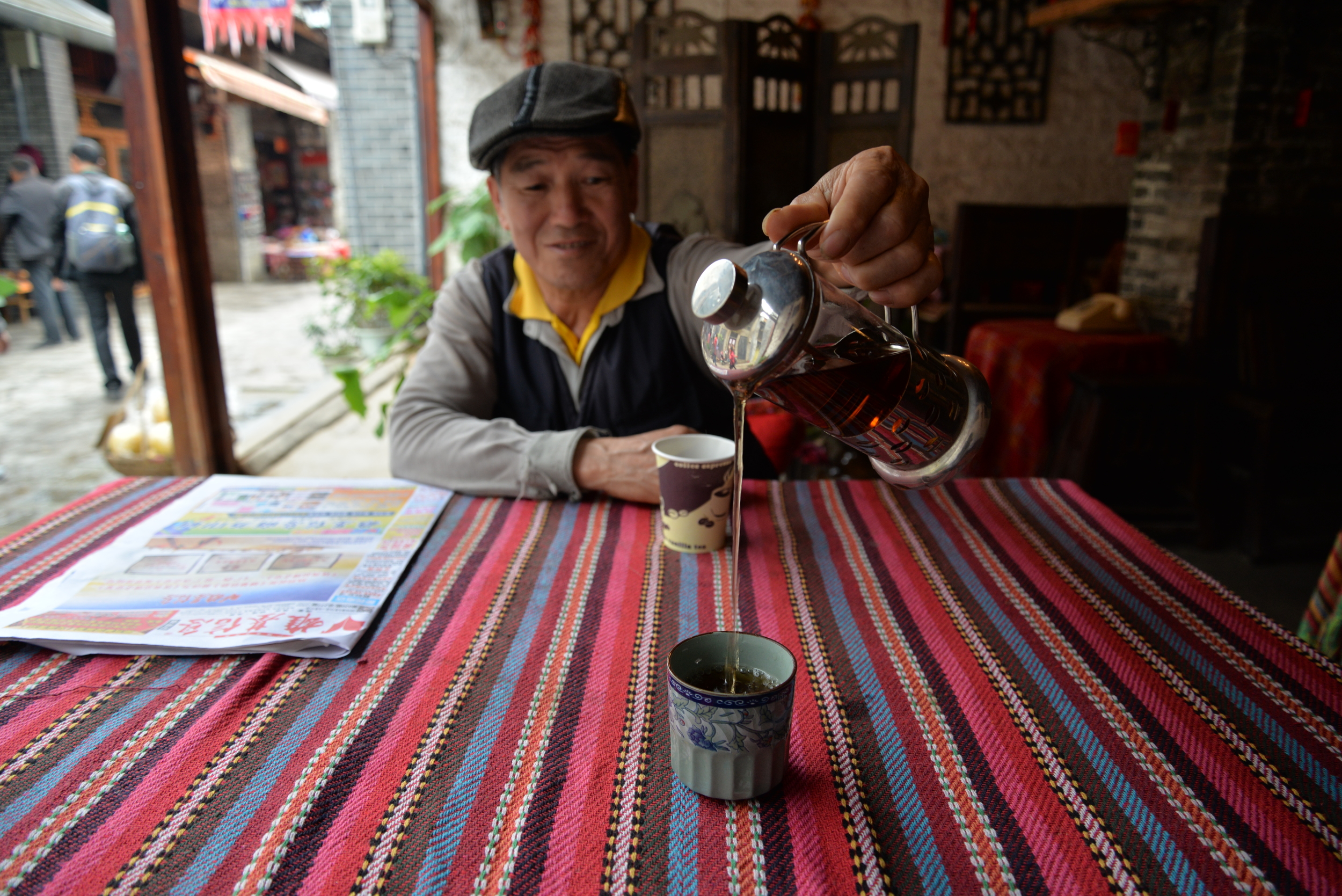
Xingping is a much larger and a more modernized town than the small village of Langshi, but not by much.
The town is filled with hundreds-of-year-old buildings nestled between more modern structures. The shop keeps of the village and their wares pour out into the narrow, ancient streets, as English music wafts lazily from cafes boasting of ‘coffee!’, ‘wine!’ and ‘cappuccinos!’ This makes me aware of how hungry I am and Mao walks me into a food spot where I order tea and fried rice.
A light bulb turns on in my head when I see that they have wifi. I pull out my iPad and bring up Bing Translate.
I type into the English box: Thank you so much for the wonderful boat ride. I am really enjoying myself.
I have this translated into simple Chinese. Mao takes a long look as he reads. At the end of the sentence, he breaks into a big grin, looks to me and gives me a reassuring nod, which I take to mean that he’s enjoying himself too.
We continue to walk the streets, looking into different nooks and crannies of shops and even stopping for more food (it is here, in Xingping, where I eat some of the best fresh made noodles I’ve ever had). It’s getting later in the afternoon and with the sun starting it’s dip westward, we return to the boat and back to Langshi.
The way back is much faster than the way in. Mao takes the boat up to a high speed and we skim down the river in a rush of water and wind. There are many more boats on the Li now, and each vessel moves into formation, like a school of fish, angling upstream towards the mountain peaks. When we arrive at Langshi, we dock and I hop out, exhausted but happy.
Later that evening, with the sun firmly tucked away on the other side of the world, Mao returns to Laojia to take me, Jesus and Jean out for night time tea on the river.
He's jazzed and in full voice, excited to get going and have an adventure. We three gather some supplies including beer and snacks, and head back to the dock. I express openly that I am relieved to have Jean in our midst, the best Mandarin speaker, to help translate Mao’s excitable communications. As we walk in the pitch darkness of the village narrows, Mao hands Jean a head lamp light, gestures to one side, gives some sort of directions and walks away.
"Mao just said that ‘she’ knows the way,” Jean translates, looking towards me with a grin.
At this, we all three burst into laughter because it's clear that neither I nor them ‘know the way’.
We wait in the darkness until he comes back at which points he leads us down the steps and back to his boat. We rearrange the little pieces of furniture on board (two benches and a box for the life vests) into a configuration for the tea and snacks.
Then, with much anticipation, we push off silently from the dock and drift into the darkness.
The Li River is now an invisible partner in the inky blackness of night. Looking up into the sky, we can still see the peaks of the majestic mountains, transformed now into onyx obelisks, supporting a dark canvas of tiny white stars.
We drift and talk in awe about the sky, the landscape and our overall experience in Guilin.
Mao chats happily to Jean, wanting to know all about him and the group through his ability to speak Mandarin. Mao lays many a compliment on me through this exchange and Jean and I both laugh with a little embarrassment at his amorous, yet harmless overtures.
The experience continues for the next hour, we each enjoying the other’s company, our boat drifting like a leaf on the water.
Only the motor of the occasional passing vessel, our laughter, our singing and the ‘lap, lap, lap’ of the water over the invisible rocks, break the silence of night.
When we return to Laojia, my energy is spent, but I’m satisfied. I turn down my bed, double check all the crevasses for spiders (a particularly huge one was hiding in a hat I tried on in the house earlier) unfurl the mosquito net and get ready to sleep. I take a swift look at the clock on my phone and see that it’s nearly 11pm.
Good for you, Felicia. You almost made it to midnight, I think to myself. I fall asleep to the silence of the Li River, congratulating myself on this very respectable bedtime.
Read about the guest house: From Ritz To Rural: House Laojia 老家
Maoshifu
experience// Mao is friends with the owners of House Laojia, which is located in the village of Langshi 浪石. To reach it, you must first make your way to Yangdi Harbor. From there, they will have a local boat driver pick you up and ferry you down the river to Langshi.
itinerary // Morning: roundtrip bamboo ride to Xingping from Langshi. Evening: Tea and star gazing on the Li River. contact // info.laojia@gmail.com
“Go for an evening boat ride with our good friend, Mao (shop owner), sipping tea as you watch the stars and the silhouette of the mountains.”
Shop our limited supply of beautiful Chinese ink brushes, hunted in Guilin.



